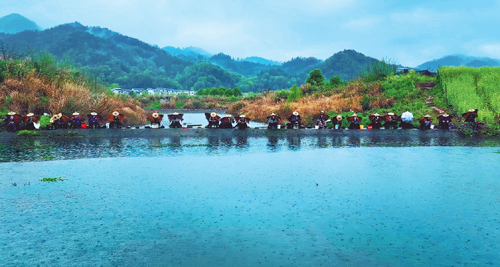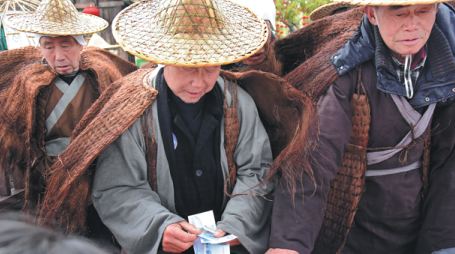The ideal retirement: getting paid to fish
Locals hired to play legendary roles at Hunan scenic park

As countless young Chinese professionals grapple with the pressures of exhausting work schedules, a scenic area in Ningxiang city, Hunan province, is offering those aged 60 and above an unconventional job that many netizens have dubbed a "dream retirement lifestyle" — paid fishing.
At Tanhe Ancient Town, a park themed on the Zhou Dynasty (c. 11th century-256 BC) culture, senior residents are being hired to play the role of Jiang Ziya — a legendary Zhouera figure known for fishing without a hook — while earning 20 yuan ($3) per hour, complete with snacks, naps and leisurely chats.
The whimsical initiative, which went viral online as a "magical employment fantasy", has drawn over 1,000 applicants, including unexpected interest from younger generations, urban residents and people from outside the province.
The campaign's viral success — sparking hashtags on Sina Weibo like "Hunan park hires 100 seniors to fish" — has also spurred discussions on replicating such "healing jobs" nationwide.
Despite capping work at four hours daily for safety, the project's appeal proved overwhelming and applications flooded in from across the country.
On March 29, the first cohort of nearly 60 silver-haired "Jiang Ziya" officially cast their lines along the scenic riverbanks, blending historical storytelling with immersive tourism. Dressed in traditional attire, these retirees showcased varied styles: some focused intently on their rods, others napped under bamboo hats and a few snacked on sunflower seeds while teaching tourists to fish.
Their catch? Not just fish — which they are allowed to take home — but also daily wages paid immediately after their shifts.
"I've fished along this river for years. Now I get paid for it!" said 71-year-old Hu Mengchu, a local selected for the role play.
Hu said that he was very happy to get the job as he can make some money from his long-time hobby.
The recruitment, targeting rural seniors, intentionally defies age-related employment barriers. With China's population aged over 60 exceeding 300 million, traditional sectors such as construction or manufacturing often marginalize older adults, limiting them to low-paying roles like security or cleaning. Tanhe Ancient Town's initiative, however, reimagines elderly labor as a cultural asset.
"This isn't a gimmick," emphasized Hu Yuting, the park's manager. "It's about creating age-friendly jobs that align with rural vitalization while enhancing our cultural authenticity."
Participants undergo brief training, physical checkups and costuming before assuming their posts at designated spots — bridges, docks or ancient streets — where they embody Zhou Dynasty lore, she said.
They also play chess and mahjong, or simply talk with travelers, she said. They bring their own fishing equipment to the park and are very professional, she added.
Most of the 60 employees are fishing lovers and farmers who live nearby, and they are glad that they can make some money during less busy times, she said.
The program's social impact resonates beyond tourism. By integrating seniors into the park's narrative, it challenges stereotypes of aging as a period of mere childcare or idleness, she said.
These roles allow seniors to contribute meaningfully, boosting income and self-worth, noted a local cultural tourism official.
Industry experts highlight the dual benefits: low-intensity employment for seniors and cost-effective cultural immersion for visitors. For China's aging rural population, this experiment in "silver-haired IP" may cast a far wider net — proving that innovation, when rooted in tradition, can reel in both economic and social rewards, they said.




Today's Top News
- Macao SAR holds flag-raising, reception to mark 26th anniversary of return to motherland
- China issues rules to regulate pricing practices of internet platforms
- US hits over 70 IS-linked targets in Syria in massive retaliatory strikes
- Technological innovation brings cultural heritage alive
- Consumption to play bigger part in growth
- Opposition moves to impeach Lai






























